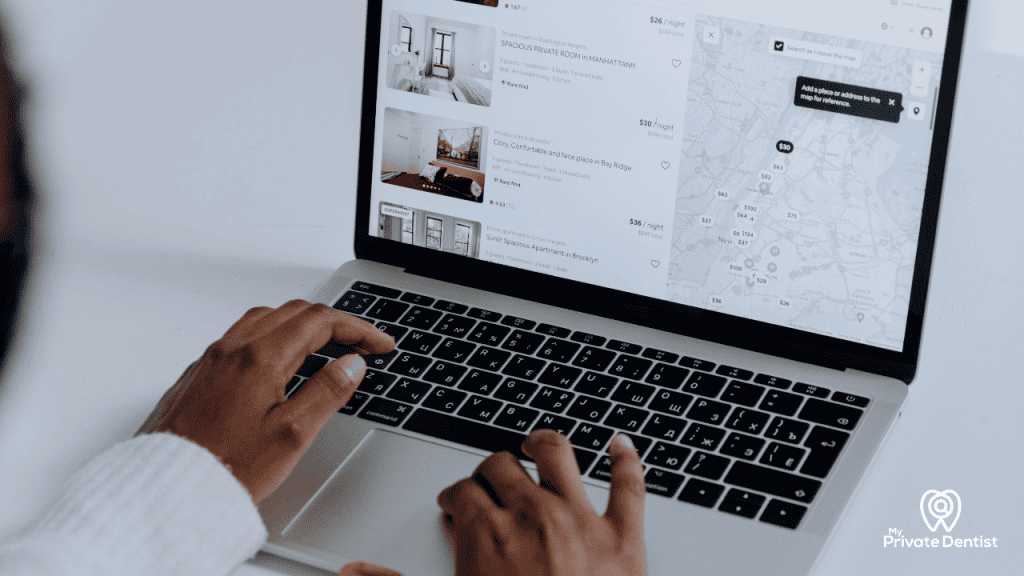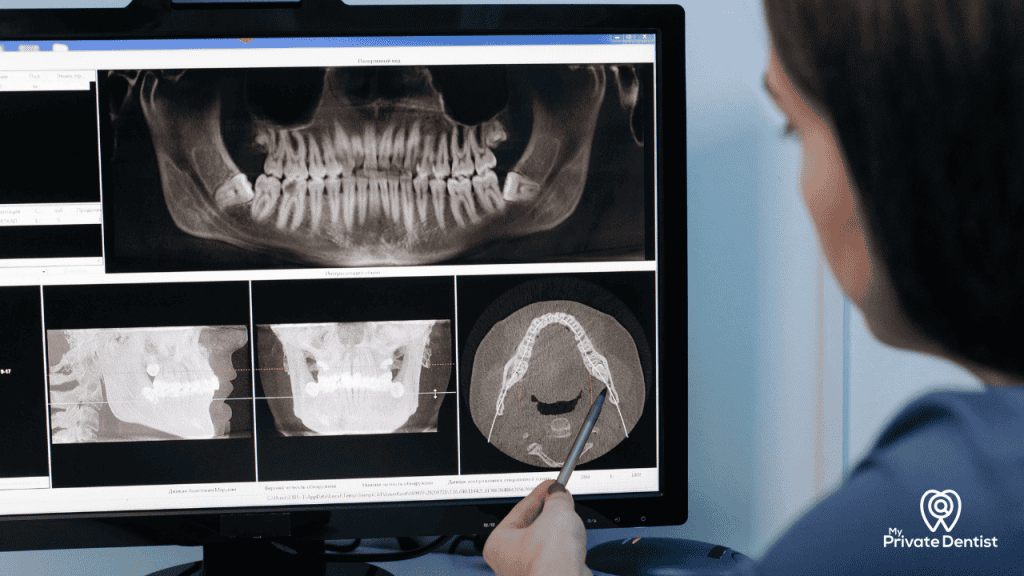Finding the right private dentist is a crucial step towards achieving and maintaining optimal oral health. In the UK, with its diverse dental landscape, making an informed choice can feel daunting. But what if you had a clear roadmap to navigate this decision?
At MyPrivateDentist.com, our mission is to connect you with exceptional private dental care. We understand that choosing a dentist isn’t just about finding someone qualified; it’s about finding the right fit for your unique needs and preferences.
This comprehensive guide will walk you through everything you need to consider. We’ll help you understand your own requirements and evaluate potential practices, ensuring you find a private dentist in the UK you can truly trust.
I. Understanding Your Needs: What to Consider First

Before you even start searching, take a moment to define what’s most important to you in a dental practice.
Consider the dentist’s location and your convenience, factoring in travel time and parking availability. Think about the specific type of dentistry you need. Are you looking for general check-ups, or do you have specific needs like cosmetic dentistry or orthodontics?
You might require restorative work, such as dental implants or crowns, or perhaps periodontal care for gum disease treatment. Some practices specialise, while others offer a full range of services like Invisalign.
It’s also important to consider your budget and financing options. Private dental care offers flexibility, so determine if you need a practice that provides payment plans, dental finance, or accepts specific dental insurance.
Lastly, assess the urgency of your needs. Do you require urgent care for a dental emergency or are you looking for routine check-ups and long-term preventative care? This will influence how quickly you need to find a practice.
Finally, think about the practice atmosphere. Do you prefer a modern, high-tech clinic, or a more traditional, comfortable setting? Are you specifically looking for a practice that caters to nervous patients?
2. The Research Phase: Where to Look & What to Look For

Once you have a clear idea of your priorities, it’s time to start your research. This is where online resources become invaluable.
A. Online Platforms (Like MyPrivateDentist.com)
Platforms like MyPrivateDentist.com are specifically designed to simplify your search for private dentists in the UK. We focus on vetting practices and presenting you with key information to help you make a choice.
We strive to ensure dentists listed on our platform are General Dental Council (GDC) registered and hold appropriate insurance. Our intuitive search filters allow you to narrow down options by location, specialisation, and specific services, saving you time and effort.
You can maximise your search by using our advanced filters. Pinpoint dentists who meet your specific criteria, whether it’s “cosmetic dentistry London” or “dentist for nervous patients Manchester.”
B. Online Reviews & Testimonials
Patient reviews offer invaluable insights into a practice’s patient care, communication, and overall experience. You should check independent review sites like Google Reviews and Trustpilot, as well as the reviews directly on MyPrivateDentist.com for practices you’re considering.
When interpreting reviews, look for consistent themes, both positive and negative. A few negative reviews amidst many positive ones might not be a red flag, but recurring complaints about specific issues (e.g., long wait times, hidden costs) should be noted. Pay attention to recent reviews for the most current picture.
C. Practice Websites
A private dental practice’s own website is a window into its ethos and services. When reviewing one, look for professionalism and design; a well-designed, easy-to-navigate website often reflects a well-organised practice.
Check if it clearly lists the services offered that you’re interested in. Take time to read the team bios to get to know the dentists and their qualifications, experience, and any special interests.
For cosmetic treatments, a gallery or before-and-after photos can provide a visual indication of their work. Also, look for clear patient information, such as FAQs, pricing guides (or transparent consultation fees), and patient forms.
D. Word-of-Mouth Recommendations
While valuable, personal recommendations should always be cross-referenced with your own research. A dentist perfect for your friend might not be the best fit for your specific needs.
3. Key Factors to Evaluate in a Private Dentist

As you shortlist potential practices, delve deeper into these critical areas.
Qualifications & General Dental Council (GDC) Registration: Every dentist practising in the UK must be registered with the General Dental Council (GDC); this is non-negotiable. The GDC is the regulatory body for dental professionals in the UK, setting standards for education, conduct, and performance.You can easily check a dentist’s registration status and any specialist qualifications on the GDC website. A reputable private dentist will prominently display their GDC number. Additionally, look for dentists with additional post-graduate qualifications or specialist registrations if you require specific treatments like orthodontics or endodontics.
Experience & Expertise: Consider the dentist’s experience, particularly in the treatments you’re seeking. While newer dentists can be excellent, extensive experience often brings a deeper understanding of complex cases. Don’t hesitate to ask about their experience with specific procedures you’re interested in.
Technology & Facilities: Modern dental technology can significantly enhance diagnostic accuracy, treatment efficiency, and patient comfort. Look for practices that invest in digital X-rays (for lower radiation exposure and instant images) and intraoral cameras (allowing you to see what the dentist sees, aiding understanding).Other valuable technologies include laser dentistry for certain soft tissue procedures, often with less discomfort, and sedation options like conscious sedation for nervous patients. Crucially, ensure the practice adheres to the highest standards of cleanliness, hygiene, and sterilisation protocols.
Communication & Patient Care Philosophy: A good dentist prioritises clear and empathetic communication. They should listen attentively to your concerns and explain diagnoses and treatment options in plain, understandable language, avoiding jargon.They should involve you in the decision-making process and discuss potential risks, benefits, and alternatives thoroughly. Transparency about pricing before any treatment begins is also key. Look for a practice that shows genuine care for patient comfort, especially if you experience dental anxiety.
Practice Culture & Team: A positive and welcoming atmosphere, from the reception staff to the dental nurses, contributes significantly to your overall experience. Observe if they seem organised and efficient, and if appointments are easy to book and manage.
Cost & Payment Transparency: Private dental fees vary based on location, dentist experience, and the complexity of the treatment. A reputable private practice will be fully transparent about its fees, often providing a clear price list or a detailed breakdown after an initial consultation.Enquire about initial consultation fees and any available payment plans or finance options to help manage treatment costs.
4. The Initial Consultation: Your Opportunity to Ask Questions

Once you have shortlisted a few practices, consider scheduling an initial consultation. This is your chance to meet the team, see the practice, and ask crucial questions face-to-face.
During your consultation, ask questions such as: “What are my treatment options for [my specific concern]?” and “What are the estimated costs involved for this treatment, and are there any payment plans available?”. You might also ask “How long will the treatment take, and how many appointments will be needed?” and “What are your emergency procedures and out-of-hours contact?”.
Don’t forget to ask: “How do you handle patient concerns or feedback?” and “What are your hygiene and sterilisation protocols?”. You could also enquire: “Can you provide more information about the experience of the dentist who would be treating me?” and “Do you offer any sedation options for nervous patients?”. Observe how patiently and thoroughly they answer your questions, as this interaction often provides the clearest insight into their patient care philosophy.
5. Making Your Final Decision & Next Steps

After your research and consultations, it’s time to make your choice. Trust your gut feeling – it’s important to feel comfortable and confident with your chosen dentist. Do not rush the decision for non-emergency treatments.
Ready to find your ideal private dentist in the UK?
At MyPrivateDentist.com, we simplify the process by connecting you with highly-rated, GDC-registered private dentists across the UK. Browse our extensive listings, read patient reviews, and find a practice that perfectly matches your needs.
Start Your Search for a Private Dentist Today on MyPrivateDentist.com!
Frequently Asked Questions About Choosing a Private Dentist
How often should I visit a private dentist for routine check-ups?
How often your dental check-ups should be can vary depending on your individual oral health needs and risk factors. While many people aim for 6 monthly appointments, your dentist will advise you on the most appropriate recall period. This could be more or less frequent depending on your susceptibility to issues like gum disease or cavities, as regular visits are really important for early detection and prevention.
Can I switch from an NHS dentist to a private dentist in the middle of a treatment?
Yes, it is generally possible to switch from an NHS dentist to a private dentist even if you are in the middle of a course of treatment. However, the private dentist will likely need to perform a full new examination to assess your current oral health and the incomplete treatment. You would then be responsible for the private fees for any further treatment. It’s best to discuss this transition with both your current NHS dentist and the potential private dentist to understand the implications fully.
What if I have a dental emergency and my chosen private dentist is closed?
Most reputable private dental practices have provisions for existing patients experiencing a dental emergency outside of their regular opening hours. This often includes an out-of-hours contact number on their answering machine or website, directing you to an emergency dentist or a rota system. If you are not an existing patient, you might need to contact an emergency dental service or use a platform like MyPrivateDentist.com’s search function for “emergency dentist near me” to find a local provider offering urgent appointments.
